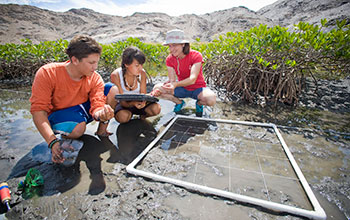Multimedia Gallery
Mentoring future ocean science explorers
San Diego's Ocean Discovery Institute aims to provide students with quality scientific education and the tools they need to succeed in STEM fields. Mentoring at every level -- peer to peer, scientist to student, etc. -- helps to ensure students become the next-generation leaders in ocean science.
More about this image
San Diego’s Ocean Discovery Institute was created to address a crisis in national science education: an acute need to provide students with quality scientific education and the tools they need to achieve. Shara Fisler, director of the institute, and the institute were a 2010 recipient of the Presidential Awards for Excellence in Science, Math, and Engineering Mentoring (PAESMEM). The National Science Foundation (NSF) administers PAESMEM on behalf of the White House. The institute empowers more than 4,500 low-income diverse youth from local communities to explore the oceans and natural environment. Its tuition-free programs incorporate education, scientific research and lessons on environmental stewardship of the oceans, our planet’s defining feature.
Fisler says scientists and policymakers need to do more to spark an interest in science among young people through mentoring and other means.
"There are roadblocks, and we wouldn’t be having this conversation today if the road to the STEM workforce wasn’t littered with blockades, unfortunately," she said at a recent event in Washington, co-hosted by NSF and AAAS entitled "New Directions for Inclusive STEM Education and Career Mentoring."
NSF works to improve STEM mentoring by supporting educators and organizations, like Fisler and the Ocean Discovery Institute, through PAESMEM. (Date image taken: 2000-2015; date originally posted to NSF Multimedia Gallery: Oct. 4, 2016)
Credit: Ocean Discovery Institute
See other images like this on your iPhone or iPad download NSF Science Zone on the Apple App Store.
Images and other media in the National Science Foundation Multimedia Gallery are available for use in print and electronic material by NSF employees, members of the media, university staff, teachers and the general public. All media in the gallery are intended for personal, educational and nonprofit/non-commercial use only.
Images credited to the National Science Foundation, a federal agency, are in the public domain. The images were created by employees of the United States Government as part of their official duties or prepared by contractors as "works for hire" for NSF. You may freely use NSF-credited images and, at your discretion, credit NSF with a "Courtesy: National Science Foundation" notation.
Additional information about general usage can be found in Conditions.
Also Available:
Download the high-resolution JPG version of the image. (1.7 MB)
Use your mouse to right-click (Mac users may need to Ctrl-click) the link above and choose the option that will save the file or target to your computer.

